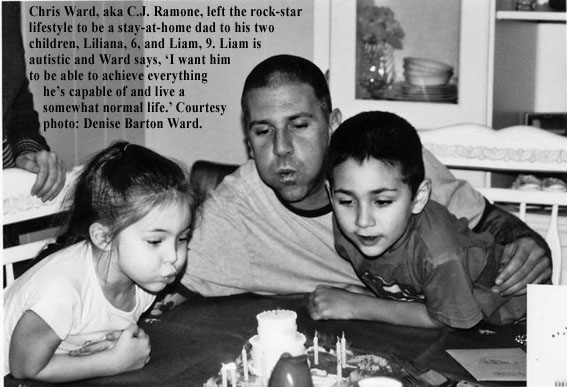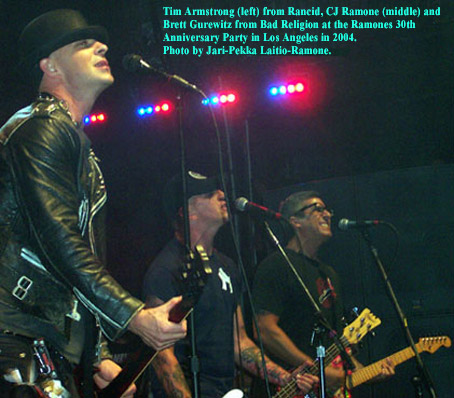This interview/ article was released in New Mexican by Wes Smalling on July 13, 2007. Here is an original link.. This interview tells lot of the CJ and how big heart he has.
It was 1989 when an ill mother and other family troubles back home prompted Chris Ward to leave active duty with the U.S. Marine Corps - without permission. Months later, he was arrested and locked up in a Navy brig. One day in jail he got a phone call. He groaned, assuming it would be his mother, who surely would be in tears hearing that her son was in a military prison.
"Hello?" he said into the phone.
"Hi Chris. It's Johnny Ramone. How long are you in?"
Just before his arrest, Ward had spent weeks auditioning with the famed punk-rock band The Ramones. The iconic group was looking to replace founding bassist Dee Dee Ramone, who had recently left the band. Ward had been invited to try out for the job through a friend of a friend, and decided to give it a shot even though he hadn't picked up his bass in more than a year. The Ramones were about to head to Europe and then to Brazil for concert tours, and Ward had made it through four auditions with Joey, Johnny and Marky Ramone before Ward was picked up by the authorities for desertion.
"It'll be six to eight weeks before I'm processed out," Ward told the guitarist on the phone from jail. "I'm sorry, man."
"Well," Johnny Ramone said, "just do your time and when you get out, you've got a job."
Ward almost passed out from the shock.
Five weeks after he was released from the brig and discharged from the military, Chris Ward had become C.J. Ramone (short for his full name, Christopher Joseph), and he and the band were belting out "Blitzkrieg Bop," "Teenage Lobotomy" and other classic Ramones minimalist-garage-rock punk tunes in front of thousands of fans in Ward's first show with the band in Leicester, England.
He stayed with The Ramones over the next seven years, touring the world and recording live and studio albums until the band called it quits in 1996.
He brought youth and vitality to an aging but still hard-rocking band that had been touring since the mid-1970s. Ward's fame came literally overnight, and the rock 'n' roll lifestyle that followed flashed by like a dream - days and nights filled with parties, booze, drugs, adoring women and fans screaming for his autograph.
But all that stuff was never really his dream. His dream had always been to raise a family. These days, he's doing just that.
"Since '89 my life was just a whirlwind, and now my life has completely changed. It's wonderful," Ward said in a telephone interview from his home in New York City. Ward divorced his first wife in 2003 - drummer Marky Ramone's niece, Chessa - and was granted custody of their two kids. Ward, who says he hasn't touched any drugs or alcohol in years, is now a full-time, stay-at-home dad, raising two children with his second wife, Denise Barton Ward, who works as an attorney.
His daughter, Liliana, is now 6. His son, Liam, is 9 years old and autistic.
Punk daddy
 When Liam was an infant, Ward knew something was wrong. Liam didn't make
eye contact and seemed to be in his own world. As a toddler, he began
throwing abnormally violent fits, sometimes banging his head on the
ground. Doctors diagnosed Liam with autism. Ward faced that challenge
head-on.
When Liam was an infant, Ward knew something was wrong. Liam didn't make
eye contact and seemed to be in his own world. As a toddler, he began
throwing abnormally violent fits, sometimes banging his head on the
ground. Doctors diagnosed Liam with autism. Ward faced that challenge
head-on. "Some parents are just devastated when they find out their child is autistic. For me it was a relief," he said. "I just felt an awesome sense of relief. I thought, 'OK, we've got a name for the demon now. What do we do to help him?'
"I don't like being on the defensive. I like being on the attack, on the offensive. That's how I faced this diagnosis. I just want what every parent wants for their child, for him to be the best he can be. I want him to be able to achieve everything he's capable of and live a somewhat normal life."
Autism is defined as a condition in a group of developmental disorders that causes impaired social interaction, communication difficulties and limited interests and activities. There is no cure, but therapies and behavioral interventions can bring about much improvement, especially if therapies are begun at an early age.
"Two things you have to do when you have an autistic kid: One is to let go of any expectations for their behaviors. You can't torture yourself with, 'Why can't he be like the other kids?' You have to accept them for what they are, but help them improve as much as possible," Ward said.
Second, "Patience is paramount. You can't expect them to learn as quickly or to do everything you want them to do when you want them to do it. Everything is work. You build a little bit at a time ... You just want him to achieve. Don't expect too much, but achieve, even if it's just a little bit. That's all any parent wants of their kids, autistic or not. You know what I mean?"
After Liam's diagnosis, Ward immediately started the boy in an early-intervention program for autistic children. Liam received speech and physical therapies at home, and Ward took him to several experimental treatments, such as light therapies to stimulate brain activity. He also participated in joint-compression programs to improve his sensory abilities, and together they learned playtime therapies that have helped Liam immensely.
"From when he was first diagnosed we just got on a mad rampage to get him whatever we could get him, whatever therapies we could find. I did everything I could. And he's really good right now. I'm just so excited because he's really doing great," Ward said.
Liam goes to regular grade-school classes. He loves music, reading and writing stories.
"He writes two or three stories a week," Ward said. "He's really into writing, which isn't really surprising - he is my son. I always leaned to the artistic side so it's really not a surprise, but it's interesting to see how much he's learned in such a short amount of time. He's come a long way."
Ward volunteers at his son's school, going on field trips and helping out with other class activities.
"I'm really, really active at both my kids' schools because I know it really makes a difference and it's neat to see it all happen," he said. "It just amazes me how much they grow and learn. They're like sponges. It's awesome. I wish I could have 12 kids, really."
Liam's autism makes interaction with classmates difficult, Ward said, but he gets along great with his younger sister, Liliana, and they play together a lot.
"She's pretty intelligent, my daughter. She knows what Liam's problem is. My daughter's pushy by nature, but she's pretty cool with her brother," he said. "I'm telling you, I'm blessed. They're really happy little guys. They really are. And I definitely consider myself to be extremely lucky."
Post-Ramones life
 Ward earned only a weekly salary and a flat fee for recording during his
seven years with The Ramones, so after the band retired he found himself
almost broke, unemployed and looking for work. He joined the
International Union of Operating Engineers and went to work running
high-pressure steam boilers in the buildings of Manhattan, working
nights so he could spend his days with his kids.
Ward earned only a weekly salary and a flat fee for recording during his
seven years with The Ramones, so after the band retired he found himself
almost broke, unemployed and looking for work. He joined the
International Union of Operating Engineers and went to work running
high-pressure steam boilers in the buildings of Manhattan, working
nights so he could spend his days with his kids. "I think it kind of baffled Joey and Johnny why I didn't feel like a Ramone, but I was never really treated like a Ramone," Ward said. "I didn't care, I was making $500 a week traveling the world with everything paid for, doing anything I wanted to do, playing music in front of thousands of people, playing soccer stadiums in Brazil packed with 60,000 people. I met everybody from Timothy Leary to Debbie Harry. Just the overall experience was worth it."
The Ramones were inducted into the Rock and Roll Hall of Fame in 2002 and the surviving members reunited at a 2004 concert along with several other musicians to commemorate the band's 30th anniversary and to raise money for cancer research. Johnny Ramone, who had been battling prostate cancer since 1999, died two days after the benefit concert.
Joey Ramone had died three years earlier of lymphoma, and Dee Dee Ramone died in 2002 as a result of his longtime heroin addiction.
Shortly after The Ramones were over, Ward turned down a chance to audition for Metallica, one of the most commercially successful metal bands around. Joey Ramone had called him up and urged him to try out for Metallica.
"I said I'm flattered, but I could never do that to my son. I could never live that lifestyle," Ward said. "I would've been making a ton of cash. I would've been able to afford my own damn tour bus, but none of it would've mattered. It would've wrecked my son's schedule, and there wasn't any way I was going to go on the road for months at a time and miss out on raising my family."
Still, Joey Ramone persisted. He called again, telling Ward he was missing a golden opportunity.
"Finally I had to put it to him in a way he would understand. I said, "Joey, me trying out for Metallica would be like you trying out for Led Zeppelin.' He laughed and said he got it. That was something he could understand."
After the 9/11 attacks on the World Trade Center, Ward worked as part of the cleanup crew at Ground Zero. He also has worked as a doorman at nightclubs.
Music is still a part of Ward's life, but it's more of a hobby now. His on-again off-again hard rock band, Bad Chopper, recently finished recording its self-titled debut album, which is scheduled for release this summer on the Acme Records label.
"We figure we'll go out and do a couple of shows, hit some of the bigger cities every once in a while and just have some laughs," he said.
Ward, 41, says he has no regrets and considers himself blessed.
"It's hard to watch sometimes some of the stuff (Liam) goes through, the tantrums and things, but there's nothing to grieve about. He's healthy, he's able to have fun, he enjoys himself. He's definitely got problems, but I really don't see what there is to grieve about."
Ward says his party years with The Ramones were great, but right now he's experiencing the most rewarding years of his life.
"Now that I have kids, now that's something. That really means something. It just feels a lot better," he said. "I definitely was living in the bottle for a long time, a quart of Jack Daniels a day kind of guy. At that pace, you're only going one of two places: dead or jail.
"To be honest, it was a relief to get off the road. I did my best at being a rock star."
Now Ward's doing his best at just being Dad. And he wouldn't have it any other way.